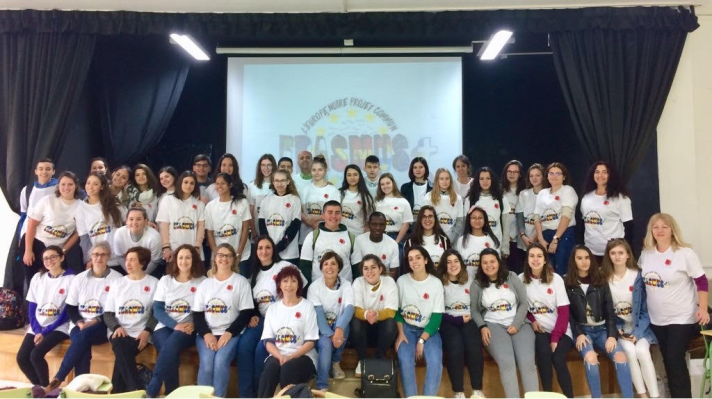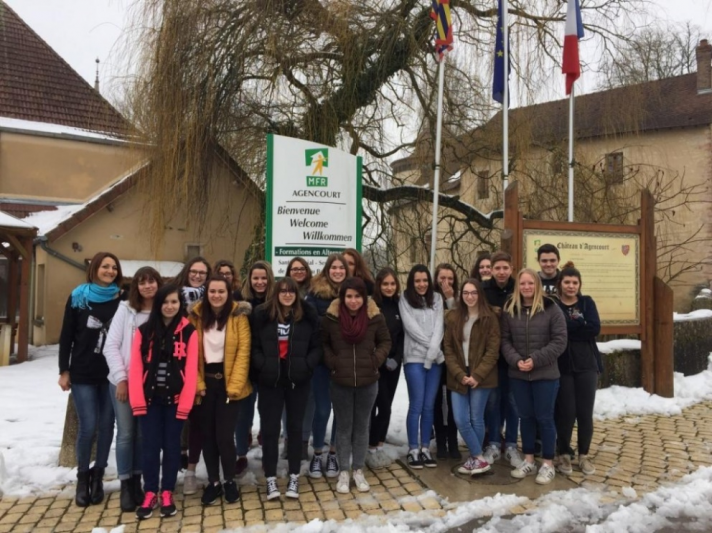Topic(s) addressed
The project’s main objective was to enhance pupils’ understanding of the European concept and the so-called European spirit. The project also aimed at renewing pupils’ motivation to further develop their linguistic, technological, and analytical competences. To this end, involved pupils were taught the most important developments regarding the founding of the European Union. A blended learning approach was used to introduce them to the different methods of video production, survey development, and of holding debates. Furthermore, external experts and pupils’ teachers guided them in combining their newly acquired skills towards the development of deliverables that could help pupils from other schools better understand the European Union. The horizontal programme priority that was chosen for this project was open and innovative education and training and youth work in a digital era. The main topics addressed by the project were “European citizenship, sensibilisation and democracy” and “ICT -new technologies- digital competences.”
Target groups
Approximately 300 participants participated in the project; 25-30 local and 11 European pupils were present for each activity, and on average, 10 teachers had accompanied pupils during mobilities. Participating pupils came from Bulgaria, Spain, France, Italy, Belgium, and Luxembourg, including 45 pupils from disadvantaged backgrounds, and 1 pupil and a teacher with special needs. Tangible deliverables were developed by and for secondary school pupils between the age of 15 to 18.
Methodologies
This project was innovative for partner schools as it allowed them to work in a more open manner by directly involving information points about the European Union (i.e. the representation of the European Commission in Luxembourg, “Maison de l’Europe”), political science institutes, Members of Parliaments (i.e. Member of the European Parliament Ms. Mady Delvaux) and contemporary witnesses (with interviews on Europe made at retirement homes). In this way, it was possible to combine both formal (didactic teaching) and informal learning (group activities). Furthermore, pupils were able to innovatively use their digital skills to document the project’s activities and to process their knowledge through motion pictures. The objective of this procedure was to make available the project’s methodology to other schools and guarantee enhanced participation of pupils from partner schools.
Environments
The use of the eTwinning platform and a dedicated TwinSpace facilitated digital learning for pupils and made the project’s organisation more feasible for teachers. To ensure wider dissemination, pupils also learnt how to share their work through a YouTube channel and how to use online platforms safely. To extend the project’s reach across partnership schools, a “Europe Day” was organised where the project’s achievements were presented to all interested individuals and schools.
Teachers
It should be noted that teachers were also involved with the new learning process with their pupils. Moreover, they continued to use these newly acquired techniques in their teaching and also disseminated them to school colleagues by using debates to process course content.
Impact
Participating teachers noticed that they had indeed managed to re-motivate several pupils with fewer opportunities (i.e. from marginalised families, or with learning difficulties) towards achieving better results during courses, with the new methods learnt from the project being of invaluable assistance in this regard. In order to continue innovative teaching on Europe, all participating schools attempt to organise a Europe Day in every school year – generally on 9 May.
- Reference
- 2017-1-LU01-KA219-023928
- Project locations
- Luxembourg
- Project category
- Secondary education
- Project year
- 2021
Stakeholders
Participants
Athénée Royal Nestor Outer
- Address
- Belgium
IES Joaquín Artiles
- Address
- Spain
Istituto Istruzione Superiore Risposto (ISISS ITN-ITG-IPS-ITC)
- Address
- Italy
Lycée bilingue de langues romanes " G.S.Rakovski"
- Address
- Bulgaria
Maison Familiale Rurale Agencourt
- Address
- France


